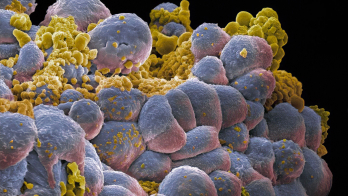

Image credit: M Brice/CERN.
Researchers working on advanced and novel accelerator technologies met at CERN on 25–28 April to draw up an international roadmap for future high-energy particle accelerators. Organised by the International Committee for Future Accelerators (ICFA) to trigger a community effort, the Advanced and Novel Accelerator for High Energy Physics Roadmap Workshop saw 80 experts from 11 countries discuss the steps needed to include these new technologies in strategies for future machines in Asia, Europe and the US. It follows recent discussions of national roadmaps in the US and elsewhere, and was timed so that advanced accelerator development can be taken into account in the coming update of the European Strategy for Particle Physics in 2020.
Given the scale of the cost of traditional accelerator technologies, which require large circular or long linear accelerators to reach the highest energies, the past two decades have seen significant progress to find alternative approaches. These include dielectrics and plasmas driven by laser pulses or particle beams, which are able to accelerate particles 1000 times more than the radio-frequency structures used in todayʼs accelerators. Major laboratories including CERN, SLAC, Argonne, DESY and INFN-Frascati are working on various techniques. CERN has recently started the AWAKE experiment, demonstrating that high-energy protons from the SPS can drive large accelerating fields in a plasma.
The next step is to apply these methods to high-energy physics. For example, the acceleration schemes must be tuned to determine their real potential for producing high-energy and high-quality particle bunches; the former has been demonstrated, but the latter remains a challenge. This requires experimental facilities that can only be hosted by international laboratories and a strong, united and co-ordinated community that merges the advanced and traditional accelerator communities.
The April event has now set this process in motion, focusing on the technical milestones that are needed to progress towards an intermediate-size particle accelerator and on the strategies needed to bring communities together. A new working group dedicated to the development of a roadmap will be included in the European Advanced Accelerators Concept Workshop in September 2017 in Elba, Italy.
“This is the first time that the advanced accelerator field is co-ordinated at the international level, and will pull the community together towards the first great challenge ahead, i.e. the achievement of reliable and high-quality particle bunches,” says workshop chair Brigitte Cros. “Further workshops will be organised to strengthen and sustain this co-ordination.”








